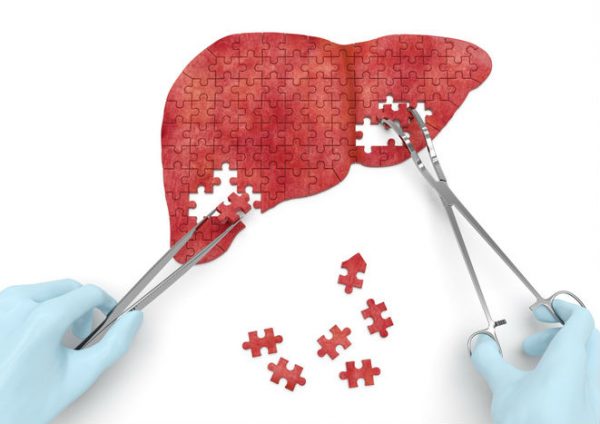

The FDA turned down an Intercept Pharmaceuticals drug application for the fatty liver disease NASH, a decision that comes nearly three years after the regulator first rejected the molecule. The agency is still asking for more data, but this time the company won’t try again. Intercept announced a corporate restructuring late Thursday that will refocus its efforts on other liver diseases.
Intercept was once considered a frontrunner in the race to develop and commercialize the first drug for non-alcoholic steatohepatitis, or NASH, a disease that leads to inflammation and scarring in the liver. The disorder, which can ultimately lead to liver failure, has been growing in prevalence. Morristown, New Jersey-based Intercept aimed to treat it with obeticholic acid, an analog of a bile acid found in humans. The drug is designed to bind to a receptor in the liver and the intestines that regulates pathways governing inflammation, fibrosis, and metabolism.
The FDA approved obeticholic acid in 2016 for treating primary biliary cholangitis, a rare disease of the bile ducts. For that indication, Intercept markets the once-daily pill under the brand name Ocaliva. It accounted for $285.7 million in 2022 revenue, according to Intercept financial reports. But the company hoped the drug’s mechanism of action would also work for NASH and it ran clinical trials in that indication using a different dose.
In 2020, the FDA rejected Intercept’s application seeking accelerated approval in NASH and called for more data. The agency did not ask the company to run another clinical trial. Instead, the FDA said it needed to see more data from the ongoing Phase 3 study. Intercept went on to produce more data, achieving results it felt supported a resubmission of a new drug application. As things turned out, the path has not been smoother the second time around.
Last month, an FDA advisory committee voted that based on the available data, obeticholic acid’s benefits do not outweigh its risks. The committee also voted that an FDA decision on accelerated approval of the drug should wait until outcome data from the ongoing Phase 3 study are submitted and reviewed. The FDA ultimately agreed. According to Intercept, the FDA’s letter to the company asked for, at minimum, successful completion of the long-term outcomes phase of the Phase 3 study.
While Intercept has been trying to bring obeticolic acid across the regulatory finish line, rival NASH drug developers have had time to catch up. Madrigal Pharmaceuticals is preparing an FDA submission for resmetirom, a small molecule that works in a different way than Intercept’s drug. Viking Therapeutics has reported positive mid-stage data for its NASH drug candidate. Others gaining ground in the NASH drug race include Akero Therapeutics and 89bio.
Intercept said its restructuring will cut headcount by about one third. At the end of 2022, Intercept reported having 341 employees. Restructuring costs are estimated to be about $16 million, according to a securities filing. With the corporate shake-up, Intercept projects it will achieve profitability in 2024.
“We believe that taking decisive action to reshape Intercept will improve our long-term ability to grow our business, innovate for patients, and create value for shareholders,” Intercept President and CEO Jerry Durso said in a prepared statement. “We remain committed to the liver community and will continue to advance our leadership in rare and serious liver diseases where Intercept has deep expertise and a recognized dedication to therapeutic innovation.”
Going forward, Intercept will still have Ocaliva, which fits within its rare liver diseases strategy. The company has also reached Phase 2 testing of that drug and bezafibrate in primary biliary cholangitis. Another program, INT-787, has reached Phase 2a testing for severe alcohol-associated hepatitis. The compound works in a different way than Ocaliva, binding to and activating a receptor called FXR. The company has said that in preclinical research, this approach has shown anti-fibrotic and anti-inflammatory effects.
Photo: Sakramir, Getty Images



















